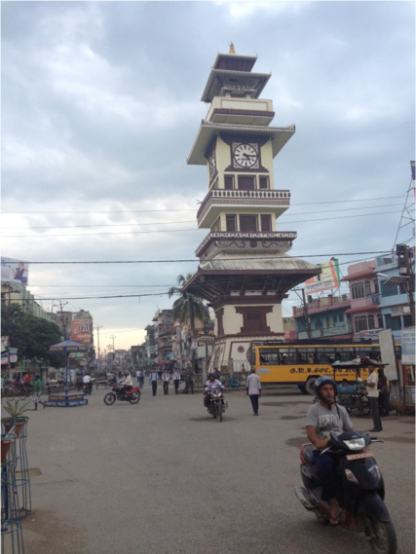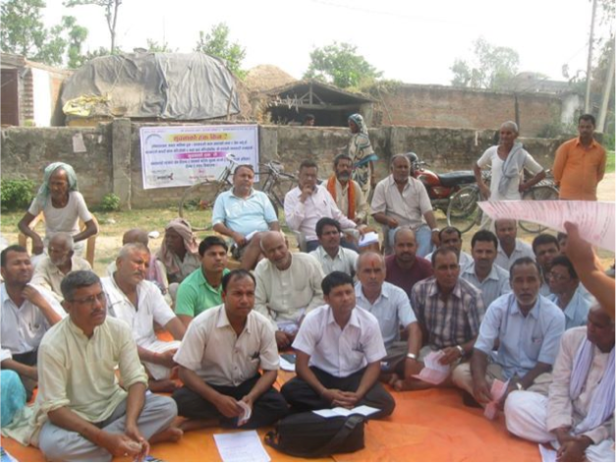Knowledge Management for Development
a global community
Even The Broken Clock Tower Gives Nepalis The Right Time Twice a Day
By: Narayan Adhikari, Nepal Country Representative
http://bloggingonaccountability.org/2013/09/27/even-the-broken-cloc...As I entered the city of Birgunj, Nepal’s hub for transit and trade with neighboring India, I could see the beautiful Ghanta Ghar towering in the distance. Beyond telling the time, the clock tower once served as a source of information, both to empower the king to monitor citizen behavior and to alert citizens of decrees and disasters through a bell system. To me, this clock, long since broken, symbolizes the wider dysfunction of Nepal’s government infrastructure: We have hospitals but no medicine, schools but no education, and power lines but no electricity.
With the growth of trade and business opportunities, corrupt private sector practices have emerged. Corruption is now rampant in every corner of Nepal’s cities and surrounding villages: from the revenue office and border security checkpoints to rickshaws and even tea shops. No hospital, school, municipality, or business is free of graft.
To confront this endemic problem, Nepal needs transparency and accountability at all levels of society. The 2007 Right to Information (RTI) Act is a critical tool to help make this happen – it represents a way to investigate corruption and hold power-holders responsible for making decisions that benefit citizens. This year, the National Information Commission (NIC) received about 1,000 applications for information and 173 corresponding complaints. However, many public bodies still lack the proper mechanisms to manage and disseminate information – the law provides for appointed Information Officers and proactive disclosure, but there is a significant implementation gap. Civil society leaders agree that RTI is a powerful weapon to break down information barriers, but in order to effectively help citizens advocate for their rights, it must be used responsibly, consistently, and creatively.
One individual who is taking a stand on the issue of RTI is Jaymod Thakur. Jaymod is a young paramedical technician from Birgunj who not only informs people in his district of RTI, but also has filled out more than 20 RTI applications to a variety of government offices, exposing irregularities and fraud. Every weekend Jaymod travels to villages, listening to ordinary people’s problems and asking for their solutions. He then files applications for information on their behalf and eagerly returns to share the results with them. He repeats this cycle, driven by his strong belief that access to information empowers villagers to fight corruption.
Here are two examples of his instructive RTI work:
1) Jaymod learned that many farmers had not been receiving the fertilizers to which they are entitled and were instead forced to buy sub-standard supplies at exorbitant rates. He called his friends to get their ideas on how to retrieve information on the shortage; together they demanded the list of fertilizer recipients from the office that oversees fertilizer distribution in the village. They found that all of the farmers who had not received fertilizers were included on this list. Jaymod investigated for further corruption and discovered that the private contractor had been refilling bags labeled as expensive, good quality fertilizer with illegal, sub-standard fertilizer. He explained the situation to the villagers, who then demanded the government to both deliver the promised fertilizer and to stop the contractors’ illicit activities. As a result, both practices were stopped.
2) There are numerous of “fraud doctors” who obtain counterfeit certificates from Indian universities and set up private clinics along the India-Nepal border – where villagers lack access to formal healthcare institutions and therefore have no other option for receiving medical care. One day, Jaymod heard a doctor advertised over FM radio, which is illegal, so he called a meeting of journalists, media groups and civil society. None of them wanted to stop the advertising because they benefited from it, so Jaymod filed RTI applications for information from the National Press Council on the registration of media groups and used it to pressure them to stop the advertisements. He then made a list of the advertised doctors and cross-checked it with the Nepalese and Indian Medical Councils, confirming that the doctors in question were indeed fraudulent. As result of his continuous pressure and appeals to the NIC and the Medical Councils, 3 radio stations stopped playing the illegal advertisements.
For many it is astonishing that a government employee is so interested in being a RTI activist. Jaymod receives threats and harassment from his employer, but he never lets these challenges thwart his efforts to help people gain access to the information and resources they need to solve problems in their communities. He believes that with personal integrity, commitment, and a network of good people, any goal is possible.
Donate !
***
note if the donate link above does not work for you, click here on donate! and at the bottom of that page click on the donate logo
***
Groups
-
KM4Dev 20 years celebrat…
13 members
-
KM4Dev Core Group
7 members
-
SA-GE - KM4Dev Francopho…
63 members
-
Agenda Knowledge for Dev…
31 members
-
KM4Dev Jobs Centre
344 members


You need to be a member of Knowledge Management for Development to add comments!
Join Knowledge Management for Development